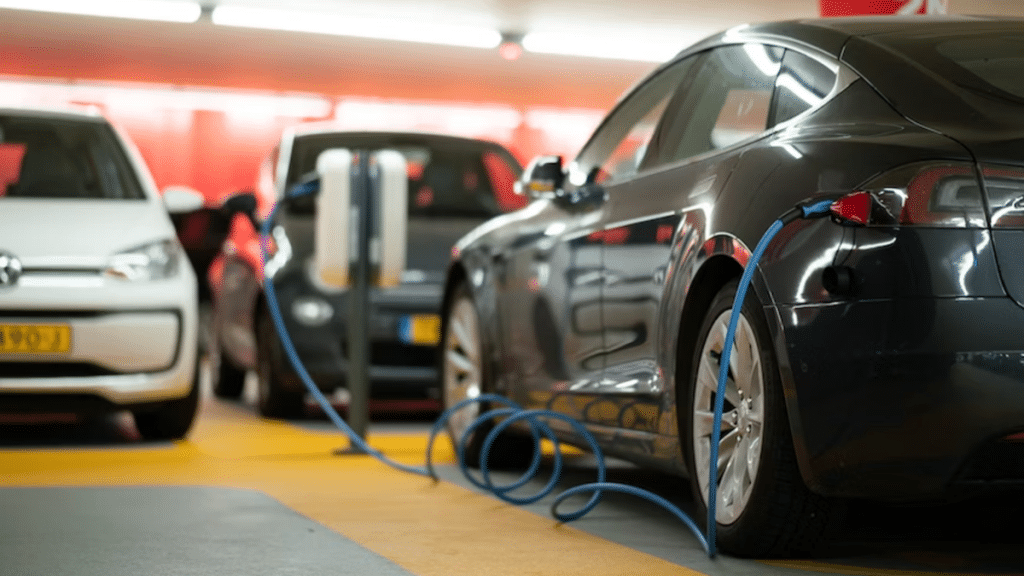When it comes to electric vehicles, or EVs as they’re being called, just about everyone has an opinion. While some people regard them as the way of the future, others believe it’s just a fad that will eventually run its course.
All these opinions have given way to many myths being born and circulated. Many of these myths relate to the fact that these cars make use of EV chargers to operate. How true are these myths? Let’s find out.
EV Statements That are Actually Just Myths!
For many people, EVs sound a little far-fetched. Additionally, people who have never driven an EV or even seen one may easily believe the myths circulating. Our experts have created a list of the more common myths and share the truths behind these statements.
Myth # 1: EVS are No Faster Than Golf Carts
Our first myth started doing the rounds when EVs first came on the scene. You’ll be surprised to learn that many electric cars are in some instances faster than gasoline-powered vehicles. This is because an electric motor generates 100% of its available torque instantly.
In fact, the Tesla Model S boasts a “ludicrous” mode and is rumoured to be one of the quickest cars in the world. By clocking 0-100 km per hour (60 mph) in a mere 2.5 seconds, we’ll assume they’re considerably faster than your average golf cart!
Myth #2: EVs are Impractical to Own with Minimal Public Charging Stations
Another popular myth that enters every EV conversation is that it’s difficult to get the charge you need.
For starters, there are about 2400 public charging stations across Australia. Additionally, investing in a home charging station equipped with a type 2 Charging Cable will ensure that your vehicle is always charged. With a fast charge option, your EV can be charged to 80% in as little as 45 minutes, depending on the type of vehicle you have.
If you install a charging station in your garage or carport where you park your car, you can easily charge your car overnight or for a few hours in the evening. Ensuring your battery doesn’t run flat takes minimal planning and route adjusting.
Myth #3: EVs aren’t Really Greener Than Gas Vehicles
Despite being kinder to the environment, many people believe that EVs aren’t actually a greener option. The reality is that 10% of Australia’s current greenhouse gas emissions are produced by cars and four-wheel drives. Since EVs emit zero direct tailpipe pollutants with no gas emissions, Australians will in fact be reducing their carbon footprint by switching to EVs.
Myth #4: EVs are High Maintenance
Anyone who has any understanding of how a petrol engine works, will tell you there’s no way an EV can be higher maintenance! The main reason for this is that EV engines have fewer moving parts which means there’s less work and costs involved in services and general maintenance.
Generally, EVs use a basic one-speed transmission and all items that need servicing are easy to maintain and considerably cheaper than their petrol-powered counterparts.
Myth #5: EV Batteries Don’t Last Long
Another common myth is that EV batteries won’t last long and will ultimately end up in landfills. Fortunately, electric vehicles carry separate warranties on their battery packs which are effective for at least eight years or 160,000+ kms (100,000 miles).
According to research, an EV owner will still have about 90% of the battery capacity intact after 200,000 miles. More good news is that EV batteries can easily be recycled.
Myth #6: EVs are Generally Unsafe
While many people consider EVs to be unsafe, here are two facts that will convince you of EV safety:
- Fires and explosions: Rumours that the EV battery will catch fire or even explode are exaggerated. Extensive testing shows that lithium-ion batteries are safer than the models used in petrol or diesel-powered vehicles.
- Crashes: Considerable testing is done to test for crashworthiness and electric cars are no more susceptible to accidents than regular vehicles. Injury estimates were also considerably lower than those expected for petrol-powered cars.
Myth #7: EVs are Expensive
This myth has some truth to it. This is because EVs do cost more to purchase initially. However, it’s worth keeping in mind that their running and maintenance costs are considerably less than petrol or diesel cars.
The good news in this aspect is that production costs are reducing, and it may soon be possible to purchase these vehicles at very similar prices to their petrol or diesel counterparts.
Final Thoughts
Misconceptions about EVs are among the most significant reasons why many people aren’t sold on the idea that they deserve a place on our roads. However, it’s important to keep in mind that myths and misconceptions are often due to a lack of information.
With the data shared in our article, you’ll have accurate information on hand the next time you hear a myth about the vehicles of the future! Debate the topic and help others see the truth as well.

